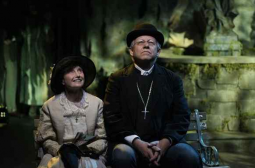‘Eccentricities of a Nightingale’ honors the unique in Tennessee Williams and in us

 Mary Jo Deschanel and Brad Greenquist in “The Eccentricities of a Nightingale,” the Tennessee Williams play that continues through Sept. 4th at Pacific Resident Theatre. (Photo by Vitor Martins)
Mary Jo Deschanel and Brad Greenquist in “The Eccentricities of a Nightingale,” the Tennessee Williams play that continues through Sept. 4th at Pacific Resident Theatre. (Photo by Vitor Martins)
By Dany Margolies
Tennessee Williams’ play, “The Eccentricities of a Nightingale,” has been said to be about good and evil, illusion and reality.
Being by Williams, it’s poetic. But onstage at Pacific Resident Theatre, directed by Dana Jackson and with her thoroughly superb cast, mommy and daddy issues reach out and clutch at the audience’s throats.
As a rewrite of his 1940s “Summer and Smoke,” “Eccentricities” feels more real, more of a psychological study and less of a classical display of symbolism.
At its core, Alma Winemiller remains the eccentric nightingale, the not particularly gifted singer with the quirky mannerisms. But her spine feels steelier here, her understanding of herself is deeper. And perhaps because of this new, “improved” Alma, she is more contented with herself.
We now cringe for the others around her, not for her.
As in “Summer and Smoke,” Alma lives in the closed system of the Mississippi Delta just before World War I. Status depends on job titles. Popularity is based on conformity. Appearance is everything. Alma is a spinster, trying to do what her martinet father demands, trying to rise above the neighbors’ malicious misguided thoughts about her mentally ill mother.
Oh, is she eccentric. But she is her own woman. So she can’t and won’t change for anyone. That’s apparently what draws her next-door neighbor, young physician John Buchanan, straight to her.
However, all this subtext would not be this apparent without the compassion and admiration director Jackson and the actor playing Alma clearly feel for that character. That actor is Ginna Carter, in a performance of a lifetime.
Those who’ve seen an Alma in other productions might, frankly, be dreading a revisit with her. She can be grating, evoking disdain or pity. Not here. Here she is such an interesting, involving character, the play’s nearly three-hour running time slips by.
There’s plenty of acting technique in here, too. Carter vibrates, not with faked, shaky distractions but with a tremendous life force that cannot be stilled. Alma’s scripted gestures have been well-considered. Even her vocal quirks have charm.
No wonder John seems to treasure her here. Andrew Dits plays him in a remarkably subtle, also respectful performance. John understands Alma, calms her without squelching her energy, admires her and likely is attracted to her.
But, oh, does he ever have a controlling mother. Mrs. Buchanan claims to care only that her sonny boy marry a fitting woman, not this preacher’s odd daughter with the lunatic mother (played with gentle otherworldliness by Mary Jo Deschanel).
But when mommy (played to chilling smugness by Rita Obermeyer), comes into John’s bedroom, strokes his head of curls and gives him a rather salacious foot rub, we wonder about her ultimate goal.
Some of John’s connection with Alma likely stems from his observation, conscious or subconscious, that her father is equally controlling, but much colder about it. The Rev. Winemiller (a seething, vitriolic Brad Greenquist), captive in a behavioral prison of his own making, is a ramrod, and if he can’t cruelly prod Alma into conformity, he’ll freeze her out of whatever affections he may have.
Even in small secondary roles (decades ago, playwrights included plentiful such characters because producing budgets allowed them), the acting is polished and era-conjuring. Alma’s acquaintances — a circle of misfits, each with his or her own odd baggage — are played with care and charm by Paul Anderson, Joan Chodorow, Choppy Guillotte and Amy Huntington, particularly good as they listen breathlessly to an offstage conversation between John and Alma.
Derek Chariton plays the strange young man ensnared by Alma’s unfortunate newfound existence at the play’s end.
Helping create this eccentric world, Kis Knekt’s scenic design of Spanish moss and faded grandeur creates a dreamscape, presided over by the stone angel symbolizing and named Eternity. It’s not a set we want to move in to, but it firmly evokes time, place and mood and holds us there.
Williams has said Alma is his favorite character and the one closest to him. After seeing this paradigm-shifting production, it’s likely audiences will feel much the same.
Dany Margolies is a Los Angeles–based freelance writer.
Rating: 4 stars.
When: 8 p.m. Thursday-Saturday, 3 p.m. Sunday through Sept 4th.
Where: Pacific Resident Theatre, 703 Venice Blvd., Venice.
Tickets: $25-$34.
Information: 310-822-8392 or pacificresidenttheatre.com.
